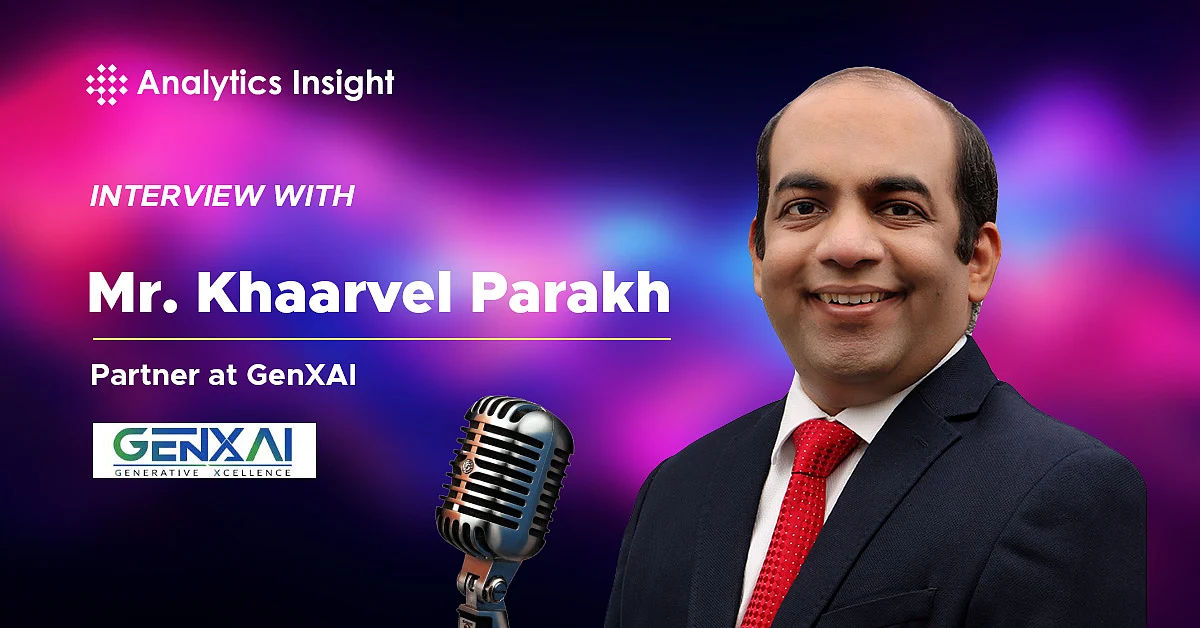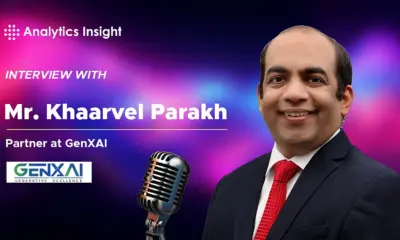Technology
AI Transformation Accelerates: Insights from GenXAI’s Khaarvel Parakh

The landscape of artificial intelligence (AI) transformation is shifting, with a focus on speed, intelligence, and streamlined workflows. Despite having access to advanced tools, many organizations still grapple with slow processes and fragmented systems. In a recent episode of the Analytics Insight podcast, host Priya Dialani engaged with Khaarvel Parakh, Partner at GenXAI, to discuss how businesses can bridge this gap and embrace the next wave of AI integration.
Bridging the Gap in Digital Transformation
During the discussion, Dialani highlighted the increasing disconnect between digital transformation efforts and the rapid pace required in today’s business environment. She pointed out that while many organizations possess modern technology, they continue to face challenges such as sluggish workflows, inconsistent systems, and repetitive tasks. According to Khaarvel Parakh, AI is poised to redefine not only the tools organizations use but also the fundamental nature of work itself.
GenXAI, which has dedicated over 14 years to assisting organizations with intricate technology and planning challenges, recently underwent a rebranding to emphasize its commitment to an AI-first approach. Parakh explained that the firm is a leader in enterprise performance management and is expanding its offerings to include generative AI solutions, custom software development, Internet of Things (IoT)-driven systems, and government initiatives focused on sustainability.
A Leader’s Journey in Technology Innovation
Reflecting on his career, Parakh shared insights from his 15-year journey through consulting, large corporations, and his own tech startup before joining GenXAI five years ago. At that time, GenXAI was rapidly growing, focusing on solutions for finance, supply chain management, and strategic planning across various industries. Now, as a leader in solution development, Parakh works closely with Chief Executive Officers (CEOs) and other executives to clearly identify their challenges and create technology that adequately prepares them for future demands.
He emphasized the importance of developing systems that effectively integrate processes, people, and advanced tools, creating a cohesive and efficient operational framework.
Throughout the podcast, Parakh discussed how AI is transforming planning and decision-making within organizations. He noted a significant shift from traditional, static processes to dynamic, predictive systems that can quickly adapt to changing conditions. With the advent of AI agents, organizations are finding forecasting, early risk detection, and enhanced decision support to be more achievable than ever before.
As the conversation concluded, Parakh delivered a clear message: AI is no longer a distant vision; it is becoming integral to how contemporary businesses think, plan, and operate. The future, he asserted, belongs to those organizations that proactively prepare, remain agile, and leverage AI to create smarter, more interconnected workflows.
In summary, the podcast episode with Khaarvel Parakh serves as a timely reminder of the pivotal role AI will play in shaping the future of enterprise operations. As businesses navigate this transformation, the emphasis on agility and intelligent systems will undoubtedly be a crucial factor in their success.
-

 Technology4 months ago
Technology4 months agoDiscover the Top 10 Calorie Counting Apps of 2025
-

 Health2 months ago
Health2 months agoBella Hadid Shares Health Update After Treatment for Lyme Disease
-

 Health3 months ago
Health3 months agoErin Bates Shares Recovery Update Following Sepsis Complications
-

 Technology3 weeks ago
Technology3 weeks agoDiscover 2025’s Top GPUs for Exceptional 4K Gaming Performance
-

 Technology4 months ago
Technology4 months agoDiscover How to Reverse Image Search Using ChatGPT Effortlessly
-

 Technology2 months ago
Technology2 months agoElectric Moto Influencer Surronster Arrested in Tijuana
-

 Technology4 months ago
Technology4 months agoMeta Initiates $60B AI Data Center Expansion, Starting in Ohio
-

 Technology4 months ago
Technology4 months agoRecovering a Suspended TikTok Account: A Step-by-Step Guide
-

 Health4 months ago
Health4 months agoTested: Rab Firewall Mountain Jacket Survives Harsh Conditions
-

 Lifestyle4 months ago
Lifestyle4 months agoBelton Family Reunites After Daughter Survives Hill Country Floods
-

 Technology3 months ago
Technology3 months agoUncovering the Top Five Most Challenging Motorcycles to Ride
-

 Technology4 weeks ago
Technology4 weeks agoDiscover the Best Wireless Earbuds for Every Lifestyle















